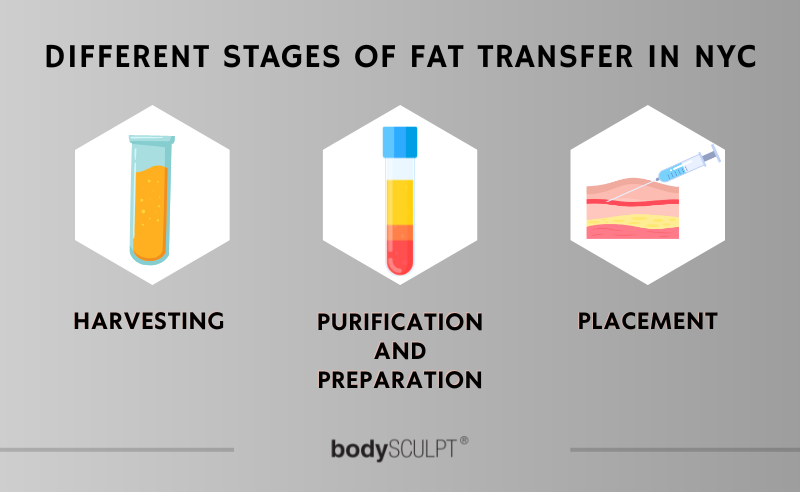A natural solution to restore volume and shape to the body, fat transfer is now a widely used technique in both cosmetic and reconstructive procedures. The procedure involves removing fat from one area of your body and transferring it to another area that needs enhancement. Performed by expert plastic surgeons, fat transfer in NYC is a safe, well tolerated procedure that produces natural-looking results.
Ready to enhance your natural beauty with safe and effective fat transfer in NYC?
Three Stages of Fat Transfer
Body contouring procedures involve removing unwanted fat through liposuction to improve shape and appearance. While earlier the removed fat was discarded as medical waste, recent years saw the emergence of a “green” plastic surgery trend where this fat was recycled and put to good use. While the fat removed during body contouring cannot be transferred from one person to another, it can be moved to another area of the patient’s body. Fat transfer from one part of your body to another can smooth out wrinkles or improve areas that have lost volume with aging.
In fat grafting, fat is harvested using liposuction from areas where it is available in abundance. Common sites for fat extraction include the abdomen, thighs, and hips. This minimally invasive cosmetic procedure is an ideal option for the following:
- Facial rejuvenation that includes cheek and lip augmentation
- Enhancing the size and shape of the buttocks – Brazilian butt lift surgery
- Composite breast augmentation – injecting autologous fat over the breast implant
- Smoothing out depressions in the breasts caused by trauma or previous surgery
Fat transfer is a three stage process:
- Harvesting: A site for fat removal would be selected and will be injected it with a local anesthetic. Your surgeon will carefully extract excess fat through a small incision, a cannula connected to a syringe is inserted and fat liposuction).
- Purification and transfer: Once enough fat is collected the donor site, your surgeon will purify the fat cells, which is then prepared for transfer to small syringes that will be used for fat injection.
- Placement: The last and final step of fat transfer is re-injecting purified fat cells to your required area that needs to be augmented. An important consideration is that not all of the fat will survive, no matter how carefully the surgeons do it and how advanced the techniques are. So in anticipation of that, surgeons overfill the area with a certain amount of fat.
Advantages of Fat Transfer
This treatment involves extracting body fat via liposuction, clinically processing it and then re-injecting it into the desired area – all in one treatment. In addition to enhancement of the desired site, one of the most significant benefits of the treatment is that it removes unwanted fat from the donor site, which could be the mid-section, flanks or thighs.
Removing fat from an area of the body where it is abundant and using it to enhance another area offers many benefits:
- Avoids implant-related complications, including the risk of inserting foreign material in the body
- Autologous fat (from your own body), reduces the chance of allergic reactions such as caused by insertion of foreign materials
- Is less invasive
- Minimal chances of tissue rejection as your own tissues are used, which improves the success rate
- Very small removal and injection sites, which speeds up recovery
- Long-lasting results, no need for replacements as with implants
Considering a Brazilian butt lift?
Read our blog: What are the benefits of the fat transfer Buttock Lift?
Some Facts About Fat Transfer
The treatment is ideal for the augmentation of small areas such as the face, according to an article in Smart Beauty Guide. It is a feasible option compared to implants or other dermal fillers when it comes to filling out facial wrinkles and creases.
The procedure has to be performed by an experienced plastic surgeon in a sterile environment. Fat is living tissue and for the treatment to succeed, the fat has to be handled to ensure maximum survival. This depends upon the surgeon’s skill in the extraction and placement of the fat tissue.
Finally, not everyone is an ideal candidate for this procedure. The purpose of fat grafting is to augment or fill in volume-deficient areas. You should have sufficient fat in the donor site that can be safely removed and the area that you want to improve should be able to accommodate the graft. You should be in good health and not have any circulation problems, either from a medical condition or smoking. A positive attitude and realistic expectations are also important attributes that determine your eligibility for the procedure.
If you’re seeking natural-looking results and safe fat transfer,
Call us at 212-265-2724
If you are considering fat transfer in NYC, choose an AAAASF-accredited plastic surgery practice. Such practices have plastic surgeons skilled and experienced in the technique. In a reliable practice, the plastic surgeon and staff would be focused on making your surgical experience easy, comfortable and productive.


